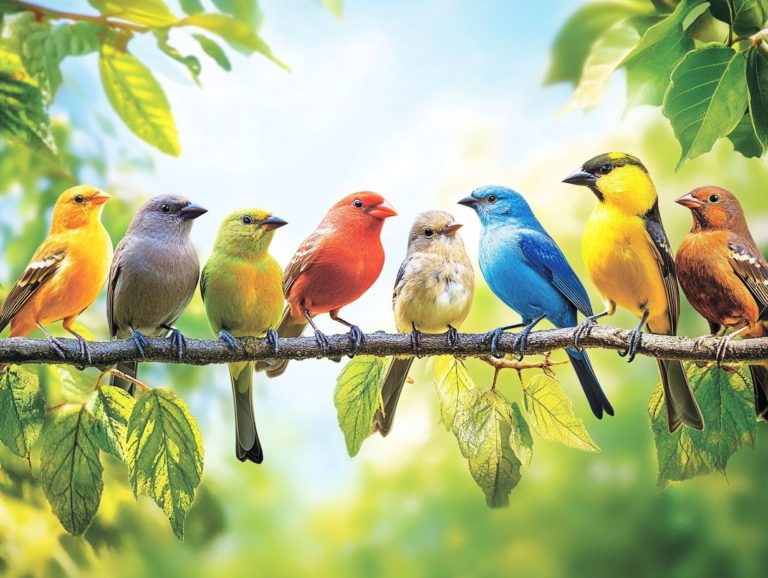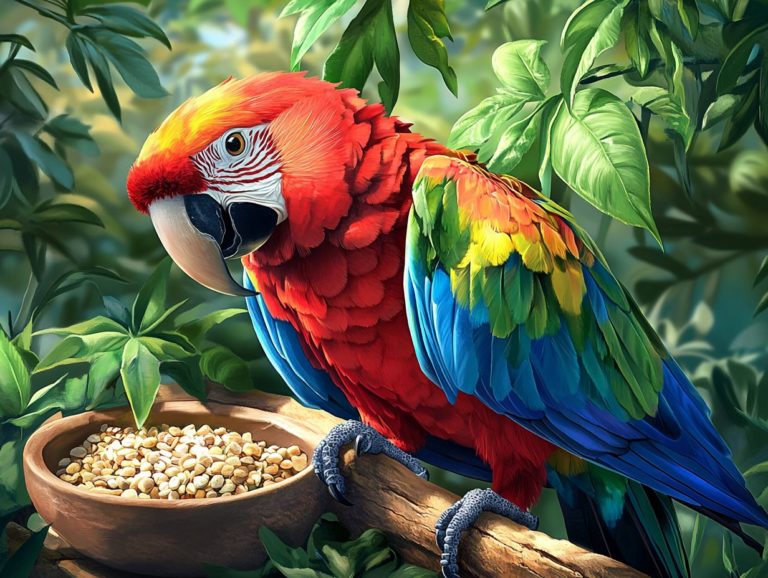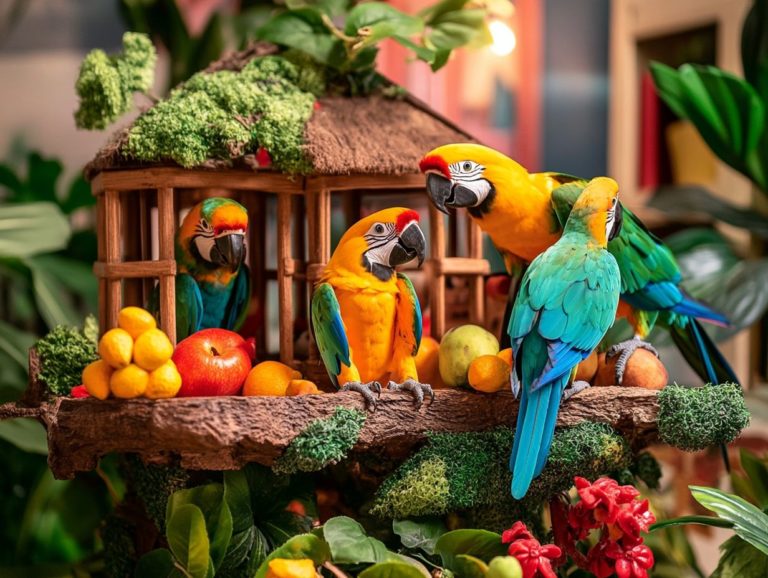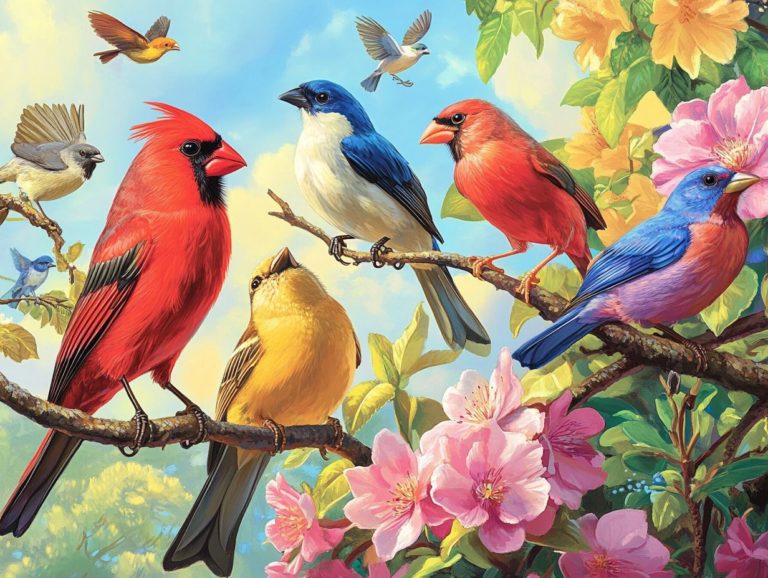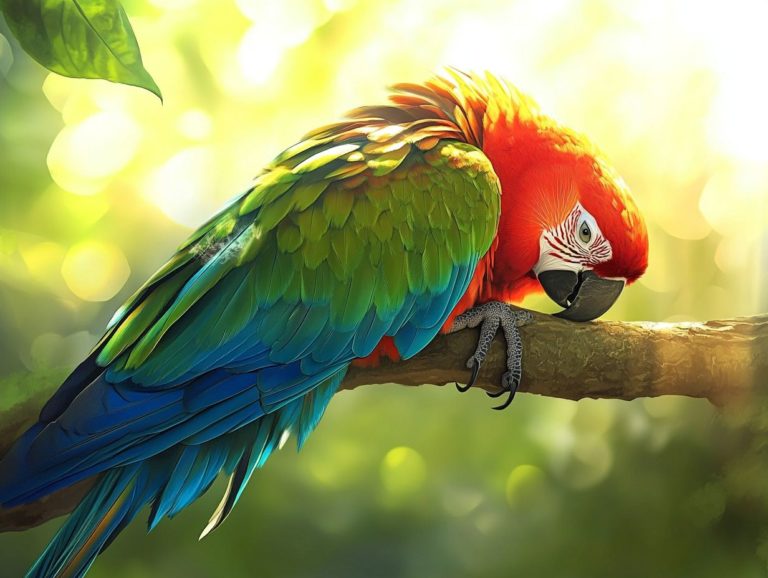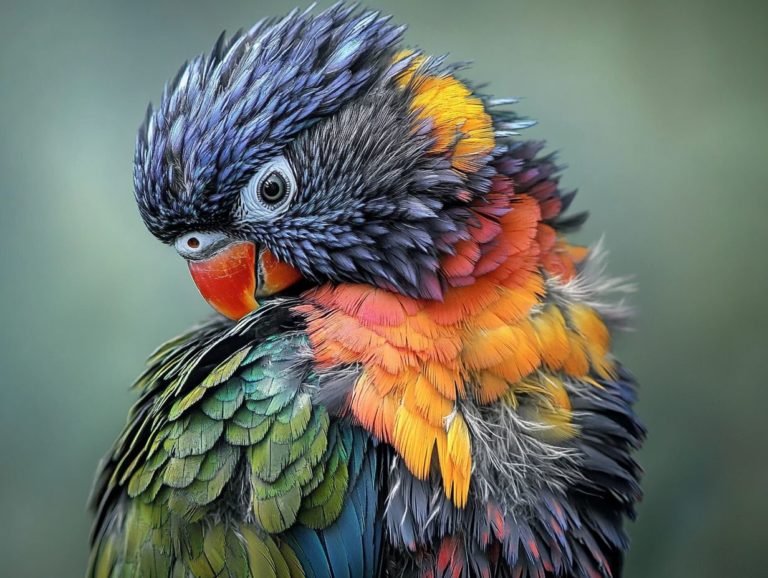The Benefits of Bird Socialization
Birds are inherently social beings. Nurturing their socialization is essential for their overall well-being.
This article delves into the significance of socialization, emphasizing the myriad physical and mental health benefits it offers, along with enhanced behavior and stronger bonds with their human companions.
Let s explore how to create a fun environment for your bird, along with practical tips and techniques for socializing your feathered friend.
Get ready to learn how to create a stimulating environment that fosters interaction and happiness for your feathered friend.
Contents
Key Takeaways:
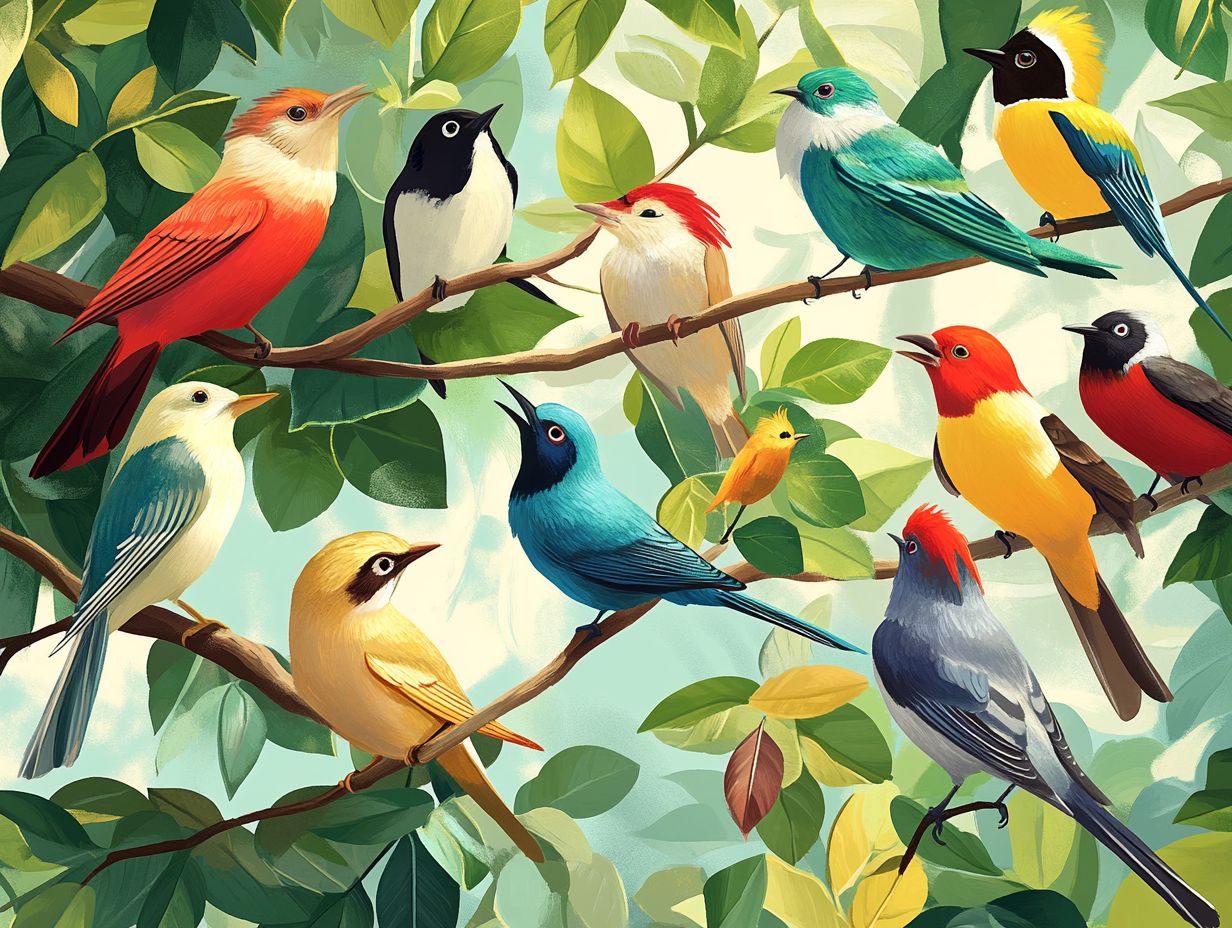
- Socialization is crucial for the physical and mental well-being of birds, allowing them to engage in natural behaviors while preventing loneliness and boredom.
- Proper socialization can lead to improved behavior and bonding between birds and their owners, creating a stronger and more fulfilling relationship.
- Effective socialization techniques include gradual introductions, positive reinforcement, and providing a safe and stimulating environment. Common obstacles can be overcome with patience and consistency.
The Importance of Socialization for Birds
Socialization plays a crucial role for birds, particularly for species like the African Grey and Galahs. It shapes their emotional well-being and overall behavior.
In their natural habitats, these flock animals flourish in social environments. This enables them to cultivate meaningful interactions and robust social bonds.
As a pet owner, recognizing the significance of social interaction is essential for creating a nurturing space where even the most timid birds can find their confidence.
Engaging in programs to help protect birds in the wild can enrich social dynamics among birds, ultimately enhancing their quality of life and behaviors in captivity.
Why Socialization is Crucial for Birds
Socialization nurtures emotional security and strengthens social bonds among individuals, especially in species like the Cressi and Tusa.
By engaging in social interactions, these birds form close relationships and acquire crucial survival skills.
For example, you might observe parrots mimicking each other’s calls, enhancing group cohesion and underscoring the significance of communication in their daily lives.
Species such as finches flourish in flocks, where understanding group dynamics is vital for navigating complex social hierarchies and securing resources.
These interactions play a substantial role in their overall well-being, highlighting how socialization promotes healthy behaviors and alleviates stress in various avian species.
Benefits of Socialization for Birds
The advantages of socialization for birds are numerous and profound.
Engaging with others helps them build confidence and promotes emotional well-being, ensuring they stay healthy and stress-free.
By fostering social interactions, you create an enriching environment that supports their overall happiness and vitality.
Physical and Mental Health Benefits
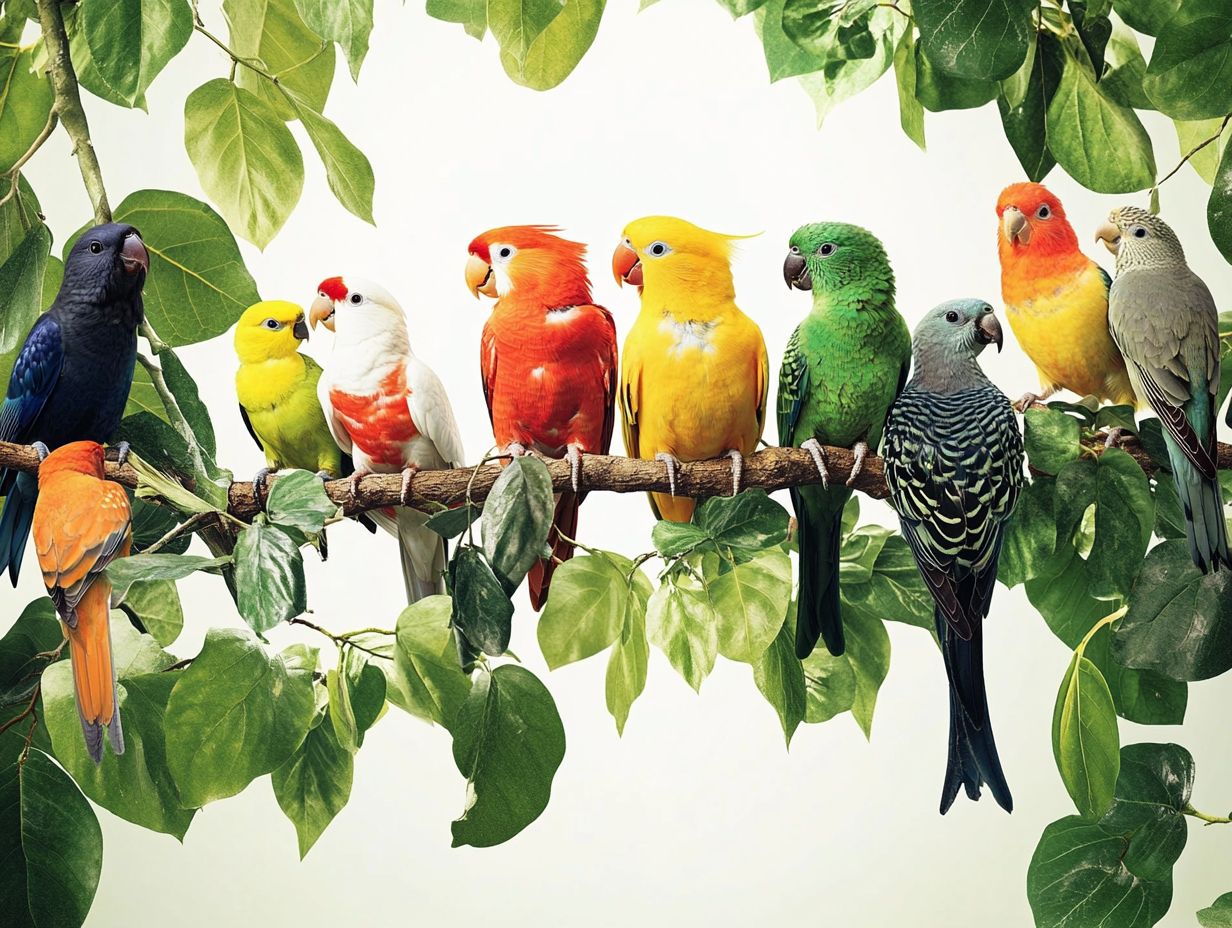
Socialization offers remarkable physical and mental health benefits for birds, enhancing their quality of life through engaging activities. For more insights, check out the benefits of having a bird, including interactive games and cognitive tasks.
When you facilitate social interactions, your birds develop essential social skills and form bonds with their companions. Understanding bird social needs in housing significantly reduces stress and fosters a sense of security.
For example, as they engage with puzzle feeders, they stretch their wings and stimulate their minds, encouraging instinctive foraging behaviors (searching for food).
Research indicates that species like parrots thrive in group settings. They learn from one another and engage in playful activities that reinforce their social hierarchies.
Cognitive tasks such as teaching new tricks or tackling puzzles are linked to enhanced mental agility, helping minimize behavioral issues and ensuring that your avian companions lead happy, fulfilled lives.
Improved Behavior and Bonding
Improved behavior and bonding in birds stem from effective socialization strategies that foster strong social relationships and enhance collective behavior, as highlighted in the emotional benefits of bird adoption.
When you engage in the socialization process, you play a pivotal role in your feathered companion’s overall well-being and happiness. This impact is especially clear in environments where rewarding good behavior is employed during parrot training. By rewarding desired behaviors with treats or praise, you deepen the bond, as your bird begins to associate your presence with positive experiences.
Organizing playdates with other birds can further enrich their social skills and cultivate a sense of community.
This mutual understanding enhances your interactions, builds trust, and reduces anxiety, ultimately transforming the dynamics of your shared environment.
How to Socialize Your Bird
To effectively socialize your bird, cultivate a relaxed environment that promotes companionship and encourages positive interactions. This approach will create a foundation for enriching experiences, allowing your bird to thrive.
Tips and Techniques for Socialization
Using interactive games and structured training techniques can significantly elevate social bonding and create a relaxed atmosphere for your bird.
These approaches enrich your bird’s daily routine and cultivate trust between you and your feathered friend. For example, introducing engaging activities like target training helps your bird acclimate to human interaction while reinforcing positive behaviors.
Offering treats during these training sessions fosters a positive association with social engagement. Incorporating problem-solving games, such as puzzles or hide-and-seek with toys, promotes mental stimulation and builds your bird’s confidence.
Over time, these practices establish a safe space where your bird feels at ease exploring new interactions, ultimately leading to a happier and more sociable companion.
Challenges and Solutions for Socializing Birds
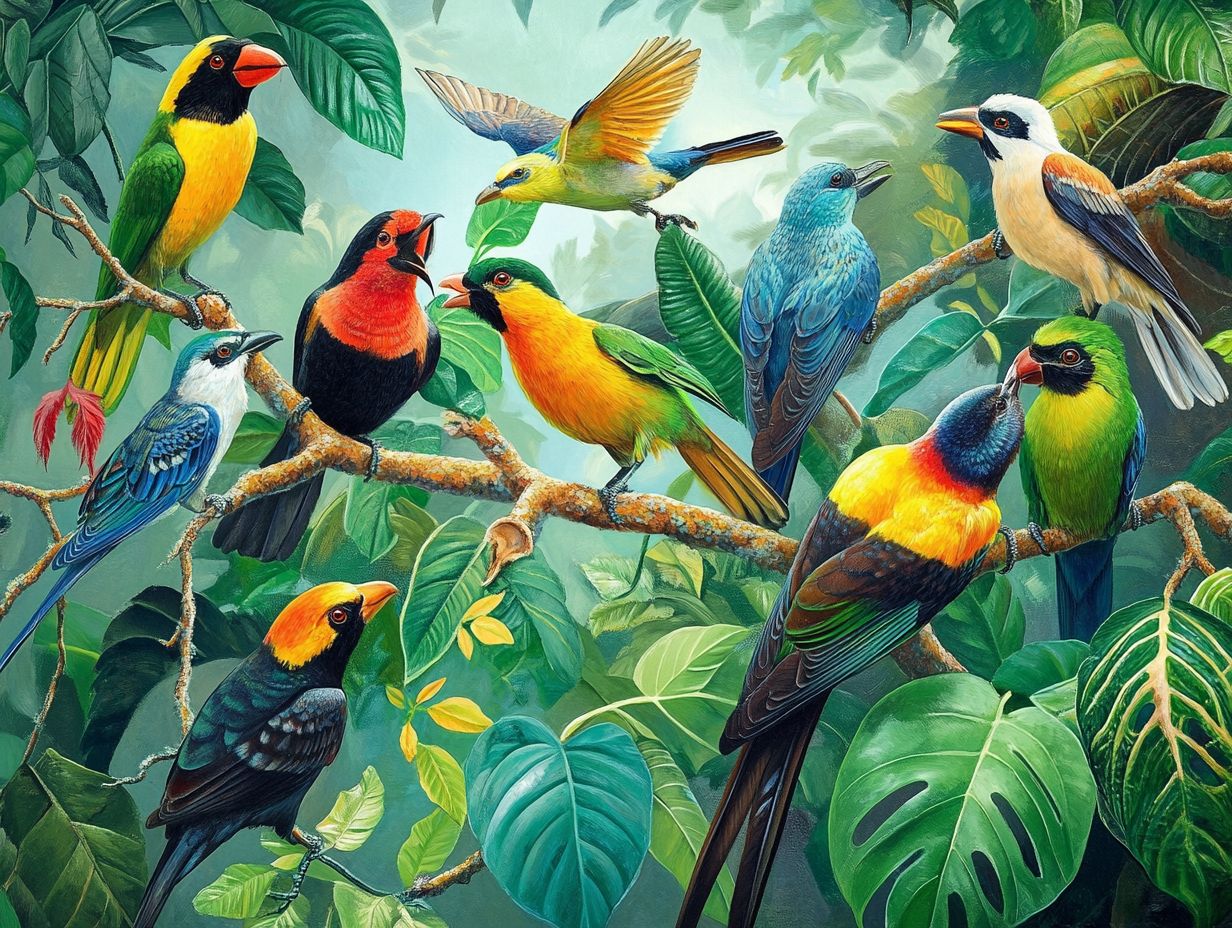
Socializing birds can pose several challenges, especially for fearful ones. By recognizing these common obstacles, you can develop and implement effective strategies, including understanding the benefits of daily training for birds, to reduce their stress and enhance their social experience.
Common Obstacles and How to Overcome Them
Common obstacles you may encounter when socializing fearful birds include anxiety and reluctance to engage. You can address these challenges using effective confidence-building techniques.
Many birds may feel overwhelmed by their surroundings, hindering their willingness to explore new social opportunities or bond with you as their caregiver. It’s essential to create a safe and predictable environment by minimizing loud noises and sudden movements that might trigger stress.
Start by gently introducing new sounds or activities, like soothing voice tones and soft music, to foster comfort and familiarity. Positive reinforcement through treats can encourage even the shyest birds to take those first tentative steps toward social interaction.
By prioritizing their emotional security, you can cultivate a trusting relationship that allows these delicate creatures to thrive socially.
Creating a Social Environment for Your Bird
Creating a social environment for your bird requires establishing a safe and stimulating atmosphere that fosters emotional well-being and a sense of community among your feathered friends.
Creating a Safe and Stimulating Environment
Creating a vibrant space for your birds will not only make them happy but also strengthen your bond! A safe and stimulating environment is essential for their well-being. It enables them to engage in healthy interactions and thrive in a nurturing pet care setting.
Focus on key elements to create this environment. Start by providing ample physical space for movement and exploration. This allows your birds to exercise and express their natural behaviors.
Social interactions with both humans and other birds significantly enhance their happiness and reduce feelings of isolation, fostering a sense of community.
Connecting with local bird clubs or organizations can elevate your involvement. It opens doors to better resources, knowledge sharing, and opportunities for enrichment activities that are incredibly beneficial for your avian companions.
Together, these factors contribute to a complete environment where your birds can truly flourish.
Frequently Asked Questions

Bird socialization refers to the process of exposing a bird to various stimuli, interactions, and experiences. This promotes their physical, mental, and emotional well-being. Understanding the benefits of wild bird watching for pet birds is crucial because it helps birds develop proper social behaviors, reduces stress and boredom, and strengthens the bond between the bird and its owner.
Bird socialization is crucial for maintaining your bird’s health and happiness! It can improve their immune system, reduce the risk of behavioral problems, and increase their overall well-being. Understanding the importance of bird socialization for wellness can help ensure that socialized birds are less likely to develop physical and psychological issues, such as feather plucking and aggression.
There are many ways to socialize a bird. Expose them to different environments, introduce them to new toys and objects, and provide opportunities for interaction with other birds and humans. Training and rewarding good behavior can also promote socialization and build trust.
Yes! Bird socialization can be beneficial for birds of all ages, including older birds. In fact, socialization helps prevent boredom and cognitive decline, keeping their minds active and engaged. To further enhance their well-being, consider exploring the benefits of enrichment for bird health. It also helps older birds adjust to new environments and bond with their owners.
Some signs that a bird may benefit from socialization include excessive screaming, biting, and self-destructive behaviors, such as feather plucking. Other signs may include fearfulness, aggression towards other birds or humans, and a lack of interest in toys or activities.
To ensure a successful socialization process for your bird, start slow and be patient. Gradually introduce new experiences and interactions, and always provide positive reinforcement. It is also important to read your bird’s body language and respect their boundaries. Seek professional help if needed.

